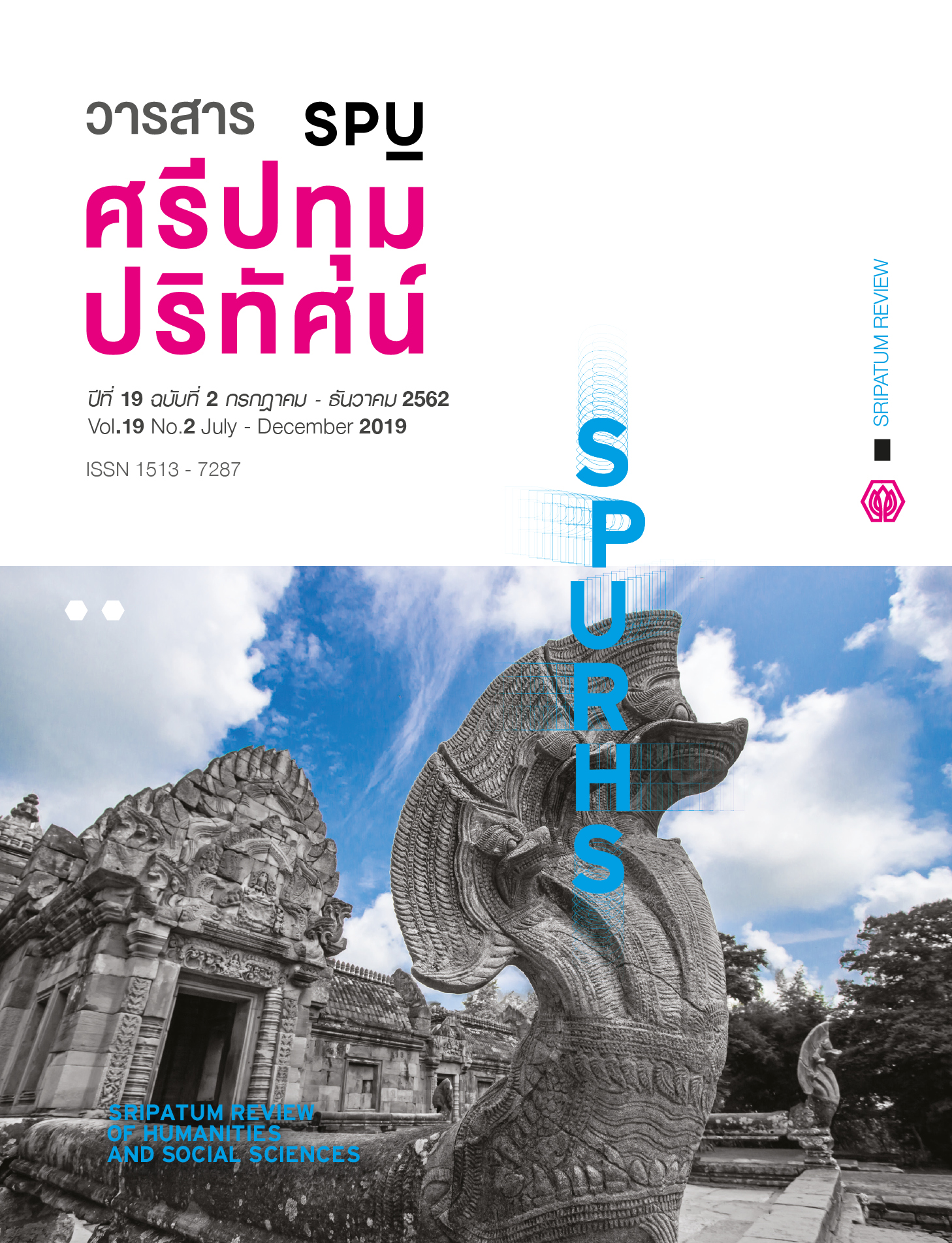การสังเคราะห์การท่องเที่ยวโดยชุมชน: โอกาสหรืออุปสรรคต่อการพัฒนาแบบยั่งยืน (A Synthesis of Community-Based Tourism: Opportunities or Challenges to Sustainable Development)
Main Article Content
Abstract
This article aims to review literature to examine and synthesize concepts and research studies related to community-based tourism (CBT) in order to indicate whether community-based tourism is an opportunity or obstacle of sustainable tourism development. The contents of the article will consist of concepts of community-based tourism management, the situation of community-based tourism in Thailand, the opportunities of community-based tourism, the challenges and obstacles of community-based tourism, and the direction for sustainable development of community-based tourism so that people in the community and policy makers will be aware of the suitability of the community development for tourism in accordance with the changing situations, especially in the issues that cause negative impact to the community more than the positive impact that the community will receive. If there is no review of the development, the results may be that the community may lose its real self-identity, the tourism resources or the good customs and tradition of the community may be destroyed on a continuous basis, as well as the emigration of people in the original community out of the community. This article will be proposing development directions for adaptation and readiness preparation for the changing trends of communities that can be truly inherited on the basis of sustainable development.
Article Details
1. กองบรรณาธิการสงวนสิทธิ์ในการพิจารณาและตัดสินการตีพิมพ์บทความในวารสาร
2. บทความทุกเรื่องจะได้รับการตรวจสอบทางวิชาการโดยผู้ทรงคุณวุฒิ แต่ข้อความและเนื้อหาในบทความที่ตีพิมพ์เป็นความรับผิดชอบของผู้เขียนแต่เพียงผู้เดียว มิใช่ความคิดเห็นและความรับผิดชอบของมหาวิทยาลัยศรีปทุม
3. การคัดลอกอ้างอิงต้องดำเนินการตามการปฏิบัติในหมู่นักวิชาการโดยทั่วไป และสอดคล้องกับกฎหมายที่เกี่ยวข้อง
References
Cooper, G. (2004). Community based tourism experiences in the Caribbean: Lessons and key consideration. Paper presented at the Caribbean Tourism Organization Sixth Annual Caribbean Conference on Sustainable Tourism Development: “Keeping the right balance –Land and Sea Encounters.”. Havana, Cuba, 6-7.
Denman, R. (2001). Guidelines for Community Based Ecotourism Development. Washington: McGraw-Hill.
Forstner, k. (2004). Community Ventures and Access to markets: The Role of Intermediaries in Marketing Rural Tourism Products. Development policy Review, 22 (5), 497-514 Retrieved June 8, 2018, from https://onlinelibrary.wiley.com/doi/abs/10.1111/j.1467-7679.2004.00262.x.
Goodwin, H. & Santilli, R. (2009). Community Based Tourism: A success?. Germany: Deutsche Gesellschaft für Internationale Zusammenarbeit (GIZ). ICRT Occasional Paper 11. Retrieved June 15, 2018, from https://www.andamandiscoveries.com/press/press-harold-goodwin.pdf.
Kiss, A. (2004). Is community-based eco-tourism a good use of biodiversity conservation funds? In Trends in Ecology and Evolution. Retrieved July 25, 2018, from https://dss.ucsd.edu/~ccgibson/docs/Kiss%20-%20%20Ecotourismbased% 20conservation.pdf.
Mann, S. (2006). Ethiopia, in Makeda’s Footsteps: Towards a Strategy for Pro-Poor Tourism Development. Washington, DC: World Bank report to Ethiopian Government.
McGettiganet, F., Burns, K. & Candon, F. (2006). Community Empowerment Through Voluntary Input: A Case Study of Kiltimagh Integrated Resource Development (IDR) in Smith. London, UK: MPG Books.
Mearns, K. (2003). Community Based Tourism: The Key to Empowering the Sankuyo Community in Botswana. Africa Insight, 33 (1/2), 29-32 Retrieved June 8, 2018, from https://www.academia.edu/408924/CommunityBasedTourismtheKeytoEmpoweringtheSankuyoCommunityInBotswana.
Mountain Institute. (2000). Community Based Tourism for Conservation and Development A Resource Kit. Washington D.C: USA.
Murphy, P. E. (1985). Tourism: A community approach. London, UK: Routledge.
Ndlovu, N. & Rogerson, C.N. (2004). The Local Economic Impacts of Community Based Tourism in the Eastern Cape. Pretoria: Africa Institute of South Africa.
Poonak, W. (2015). The Potentials of Amphawa Community in Managing Community-Based Tourism of the Amphawa Floating Market. Academic Services Journal Prince of Songkla University, 26 (1), 63-74. (In Thai)
REST. (2010). Community based tourism handbook: Principles and meaning. Retrieved July 25, 2018, from https://www.sribd.com/doc/32621006/community-basedtoutism.
Sarobol, S. (2003). Community Based Tourism CBT: Concept and Experiences of the Northern Region. Chiang Mai: Thailand Research Fund. (In Thai)
Scheyvens, R. (2002). Tourism for development: empowering communities. Harlow: Pearson Education Limited.
Sebele, L.S. (2010). Community-Based Tourism Ventures, Benefits and challenges, Khama Rhino Sanctuary. Harry Oppenheimer Research Centre, University of Botswana: Botswana.
Tidtijumreonporn, T. (2014). Capacity Management for Community Based Tourism: CBT in Kampong, Mae On District, Chiang Mai Province, Phase 1. Payap University. Chiang Mai: Thailand Research Fund. (In Thai)
Thongma, W. (2007). Community Based Tourism: CBT for Improving the Quality of Life of Communities in Forest Land.
Training Manual. Retrieved July 25, 2018, from www.dnp.go.th/fca16/file/i49xy4ghqzsh3j1.doc. (In Thai)
Timothy, D. (2002). Tourism and Community Development Issues. New York, USA: Channelview.
Okazaki, E. (2008). A community-based tourism model: Its conception and use. Journal of Sustainable Tourism, 16 (5), 511-530.
Weaver, D.B. & Lawton, L.J. (2007). Twenty years on: The State of Contemporary Ecotourism Research. Tourism Management. 28: 1168-1179. Retrieved July 12, 2018, from: www.ethioembassy.org.uk/trade_and_investment/Tourism_2010.pdf.


